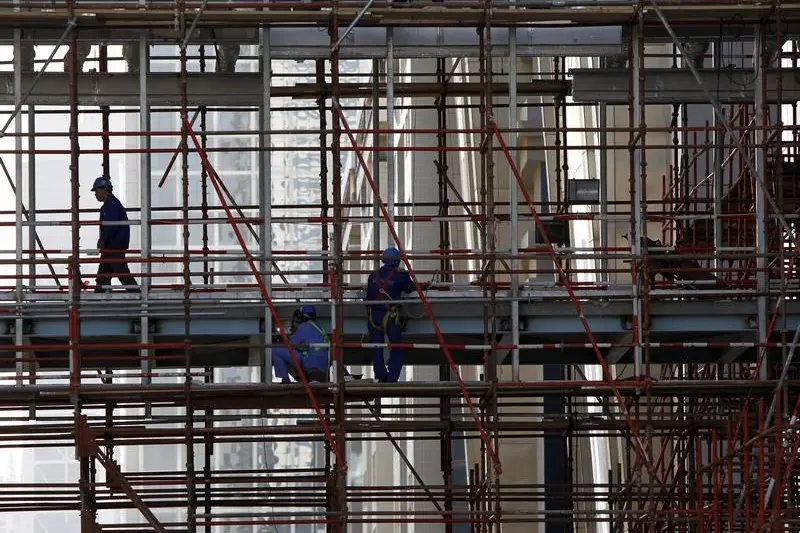PHOTO
UAE - A two-day workshop organised by the Ajman Municipality and Planning Department (AMPD) has agreed that sunshine is Ajman's biggest advantage in developing a green city.
Sheikh Rashid bin Humaid Al Nuaimi, chairman of AMPD, who attended the workshop reiterated the emirate's commitment towards reducing the effect of climate change in Ajman. He also expressed confidence that the workshop will be an excellent opportunity for the participants to gain valuable expertise on green practices, eco-efficient technologies, managing the carbon footprint, and supporting the expansion of environmentally friendly and sustainable initiatives.
The workshop titled 'Green Buildings and Green City in Ajman' held Monday and Tuesday as part of the 5th Ajman International Environment Conference on Climate Change and Sustainability featured several internationally acclaimed environmental science experts.
Prof Riadh Al Dabbagh, Ajman University, who chaired the workshop highlighted the need for collective efforts to meet the challenges posed by climate change.
Prof Ali Sayegh, chairman of World Renewable Energy Congress and director general of World Renewable Energy Network, said that buildings are the biggest energy consumers, followed by industries and transportation. The town planning authorities must interfere to reduce energy consumption in buildings and transportation.
"Reduce traffic jams, it is a disaster. Encourage clean, sustainable and smart transport, mainly public transportation. Encourage bike lanes and bikes' sharing parking areas in cities. Also, increase green open spaces and encourage walking paths for better health benefits to make," he said.
Speaking about Photovoltaic (PV) applications in buildings and PV Islands or Large Projects,' Prof Ali Sayegh said that Ajman's biggest advantage in developing a green city is sunshine, available more than nine hours a day, throughout the year.
Taking cues from the best practices across the world, he said: "You don't have an excuse for not using PVs. You can use PVs as exterior wall claddings in high-rise buildings, as solar roof tiles, or have floating PV panels."
Dr Abdul Salam Darwish, director of Phoenix Renewable Energy Centre and head of engineering department at Manchester Trinity College, UK, said that the emirate of Ajman has a substantial amount of natural and clean energy resources. Speaking about the renewable energy potential in Ajman, he pointed out that the amount of available alternative energy can meet both the present and future energy demand and could possibly be exported to other emirates.
"Solar-powered buildings are the best solution for integrating the green-smart building concept into Ajman's urban landscape. These new structures must be designed in such a way that they optimise and capitalise upon the emirate's climatic challenges," he said.
Dr Mark Jentsch, assistant professor at Bauhaus University, Germany, said that of the total energy consumption in buildings across the UAE, 66 per cent energy is used for space cooling, which is very high. He urged the local government authorities to evolve strategies to reduce energy consumption used for space cooling by improving building fabric quality, adopting solar shading and by addressing user behaviour.
Prof Marco Sala, Florence University, Italy, said that sustainability is not only related to buildings. A city can be defined sustainable city if they have good development in several fields starting with transportation.
"Yes, the severe hot climate is a major problem here as you have no control over it. But there are other problems that can be controlled. Some of the most effective ways are to provide better public transportation to mitigate carbon dioxide (CO2) and other greenhouse gas emission and to make city green by promoting farming. Of course, it needs extra efforts in this country, but this can be a major contributor in making the city green," he added.
The workshop concluded on a high note as environmental experts of international repute enlightened the participants on how communities and businesses implement innovative green practices toward the realisation of a sustainable future.
Khaled Moeen Al Hosani, executive director of public health and environment at AMPD, and chairman of the organising committee of the conference, said that the workshops would contribute to use the experiences in protect the environment, natural resources and creativity in "green technology".
It also boosts the culture of "sustainable development", through participation and encouraging the institutions to adopt the best green practices, which aims to preserve the environment and natural resources and achieving the concept of sustainable development.
Copyright © 2018 Khaleej Times. All Rights Reserved. Provided by SyndiGate Media Inc. (Syndigate.info).





















